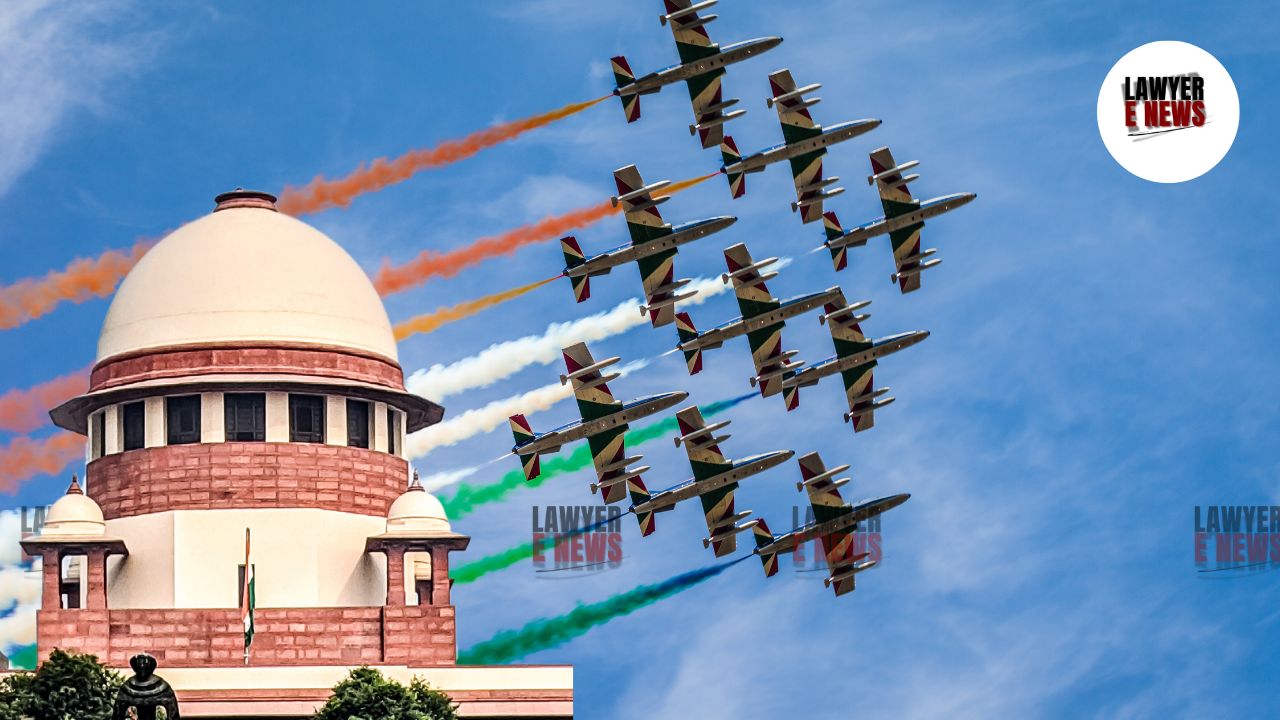-
by Admin
15 February 2026 5:35 AM



In a landmark judgment on October 21, 2024, the Supreme Court of India in S.P. Pandey v. Union of India & Ors. awarded ₹1 lakh to an Airman in the Indian Air Force, S.P. Pandey, for enduring wrongful disciplinary action stemming from a minor infraction. The Court, comprising Justice Pamidighantam Sri Narasimha and Justice Sandeep Mehta, criticized the officer’s handling of the incident as "vindictive," noting that the situation could have been resolved with a simple warning rather than formal discipline.
The dispute arose from a 2010 incident in which Pandey was reprimanded by Squadron Leader H.V. Pandey after allegedly overtaking vehicles at a closed railway crossing. The Squadron Leader forcibly confiscated Pandey’s motorcycle keys and placed him in closed arrest, following which disciplinary charges were filed for insubordination and violation of Air Force regulations. This escalated to formal proceedings resulting in an admonition.
After challenging the disproportionate nature of his treatment, Pandey approached the Armed Forces Tribunal (AFT), which quashed the admonition. The Tribunal condemned the Squadron Leader’s response, remarking that the Air Force had failed to act proportionately, and noted that Pandey’s humiliation appeared driven by vindictive motives. Although the AFT quashed the admonition, it did not award compensation, leading Pandey to appeal to the Supreme Court.
Key Observations by the Supreme Court
1. Vindictiveness and Proportionality in Military Discipline:
The Supreme Court agreed with the AFT’s assessment, calling out the officer’s “excessive” response to a minor breach. The Court remarked that discipline must be maintained with balance and dignity and emphasized the importance of a humane approach within disciplinary frameworks.
“Small incidents of indiscipline…must be met with responses in proportion to their gravity,” the Court noted, adding that military officers have a responsibility to exemplify restraint.
2. Institutional Responsibility and Dignity:
The Court highlighted that Pandey’s dignity had been compromised and his rights disregarded throughout the ordeal. It noted that the institution should have intervened to protect him instead of endorsing punitive actions.
“The institution did not protect him; instead, it put its full force behind the respondent,” the Court observed. This statement underscored the need for military institutions to support their personnel’s dignity rather than subjecting them to disproportionate punishment.
3. Right to Compensation for Unjust Treatment:
Awarding ₹1 lakh as compensation, the Court acknowledged that monetary compensation could not fully address the emotional and financial distress caused but served as a “token of concern” for Pandey’s identity and rights.
“Legal remedies enable us to settle [such issues] only as a measure…in recognition of a citizen’s identity and dignity,” the Court said, underlining the importance of protecting servicemen’s rights in disciplinary processes.
The Supreme Court’s decision marks a significant moment in service law, where the Court acknowledged the impact of disproportionate military discipline and addressed the need for balanced governance in military institutions. The judgment underscores that senior military officers must act with sensitivity, especially in public settings, and refrain from punitive actions that may humiliate or harm personnel unnecessarily.
This ruling not only provides relief to S.P. Pandey but also serves as a precedent for future disciplinary cases in military service. The Court’s award of compensation emphasizes that institutions must consider the dignity of their personnel in all disciplinary actions and that even minor transgressions should not result in disproportionate, vindictive responses.
Date of Decision: October 21, 2024
S.P. Pandey v. Union of India & Ors., Civil Appeal No. 6186 of 2018
